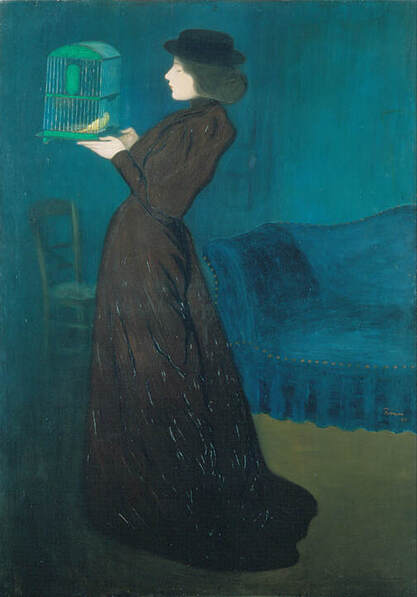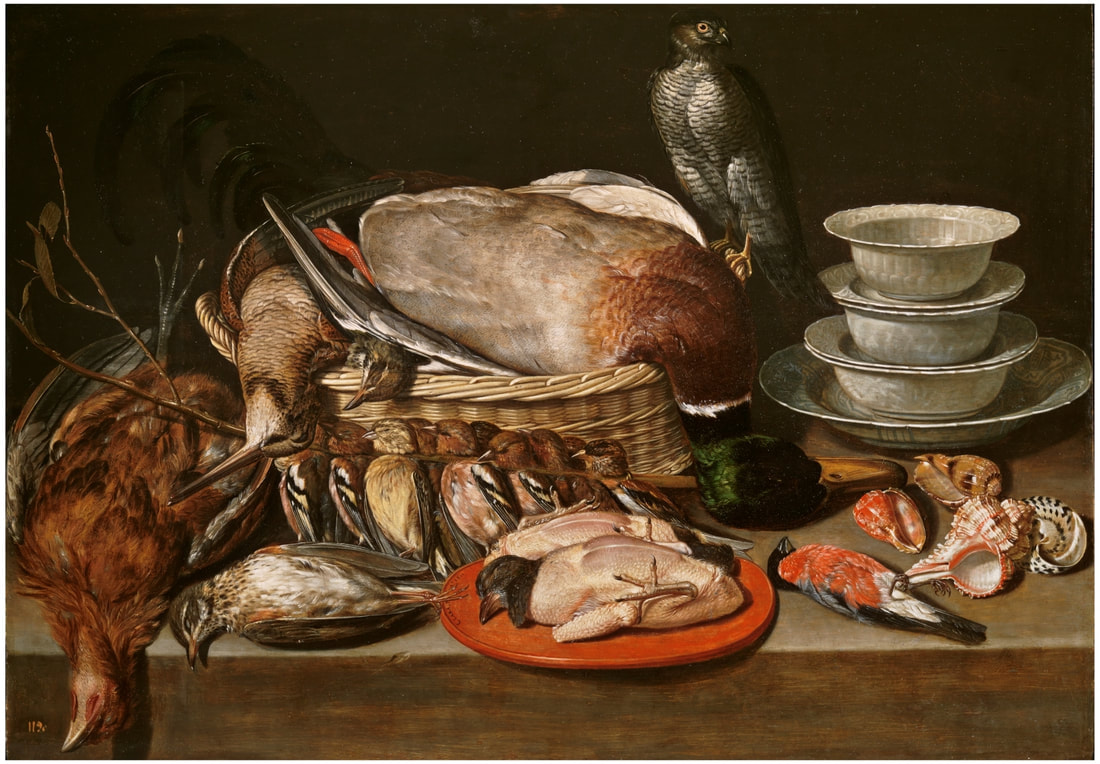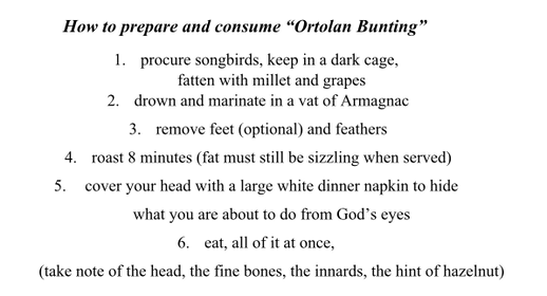Congratulations to Our Bird Watching Contest Winners!!!! Barbara Ponomareff and D. Walsh Gilbert5/25/2021 Congratulations to our ekphrastic Bird Watching writing contest winners! Barbara Ponomareff is our winner for flash fiction. D. Walsh Gilbert is our winner for poetry. Scroll down to read the winning entries below. Many thanks to our special guest judges: Tricia Marcella Cimera for poetry, and Karen Schauber for flash fiction. The Ekphrastic Review simply asked the judges to choose their favourite work in the category of their expertise. We did not specify any other instructions, or give them a criteria to work with. How they decided to read the works, contemplate them, and choose the winning entry was entirely their call. As editor of this journal, reading hundreds of poems and stories every single month, I know we are a magnet for incredible creativity and talent. Whittling down a barrage of bird watching entries into a few for each category was tough enough. (Read all of the flash fiction finalists here. Read all of the poetry finalists here.) Congratulations to Barbara Ponomareff and D. Walsh Gilbert for your outstanding contributions. Congratulations to all of our finalists. (Read the flash fiction finalists here, and the poetry finalists here.) Congratulations to everyone who entered the Bird Watching contest, because creating new art from art is what this is all about, after all. Barbara's story will be published by Karen Schauber in her flash fiction column at The Miramichi Reader. Debbie's poem will be featured in Tricia Marcella Cimera's Fox Poetry Box. Both will receive a $100 prize. Congratulations again! A million thanks again to our judges, and to everyone reading and writing ekphrastic. Tricia Marcella Cimera: I read all the amazing finalist poems blindly. I read them multiple times and all struck me in different ways, like the wings or songs of different birds. The one that haunted me the most, stuck with me the most, made me feel intensely about both birds and poetry, was "Woman with a Bird Cage," by D. Walsh Gilbert. The feelings of wistfulness, sorrowfulness, hopefulness, taking flight, opening a door, breaking free, as well as the gorgeous alongside comparison to plants and flowers was overpowering to me. I felt this poem. It is beautiful on many levels. The language is gorgeous, the homage/inspiration to the seed painting by József Rippl-Rónai is strong, the subtlety coupled with accessibility makes for an understandable yet enigmatic poem. I feel it is very special. Karen Schauber: What a wonderful showing of talent and enthusiasm for the flash fiction form. Thank you, Lorette, for inviting me to judge this selection of flash fiction finalists. The Ekphrastic Review invites such imagined and well-crafted responses to artwork. It is a privilege to be asked to judge someone else's work, and I am careful with this trust. What speaks to one judge may elude another. And although there is only one winner here, several of the entries show genuine merit. Voice, authenticity, along with powerful imagery and emotion always shine through. Keep in mind that judging is a subjective process. So, if your piece did not rise to the top in this ekphrastic contest, it may very well in the next one with a different judge who brings a different sensibility and aesthetic. Please submit again. What I look for in a winning flash fiction is a story that responds most closely to the selected artwork: a piece that is beautifully written either in its simplicity or sumptuous imagery—a demonstration of its intentional word choice, a story that brings out the emotive reach of the painting, and a story that invites the reader to explore the recesses of their own imagination in-between the lines and white spaces. For me a flash fiction must present a full-arc -a beginning, middle, and end- layered, and with more to discover in each subsequent read. It should not feel rushed but carefully crafted. And be evident that it could not have been written in any other form than concision. By the end of the piece, something at its core should have undergone a transformation (either internal or external, imagined or proscribed, far-reaching or miniscule). Above all, the writer's delight / obsession with the flash fiction form should come through. "Stepping on the Throat of Their Song" by Barbara Ponomareff is a marvel. From the title to its final utterance, the reader slips through the seam into a dreamy and nightmarish sensory experience, a world of carnage and devastating beauty. The language of death here is sensorial, brutal, exacting, and exquisite. The words feel handpicked, but never overwritten; the imagery indelible— "its limp neck still droops like a spent rope", "colours from madder-rose to a pale shade of lemon", "a whittled willow branch that pierces each throat", " deep cinnabar colour, toxic", "Night still sticks like pitch to the background of the scene".... It all works like alchemy to bring the reader to the hawk's "head averted from the carnage to let his all-knowing eye focus just beyond what he did", with the complicity of the large white dinner napkin (which shows up twice in this very brief piece), to drive home its powerful message—"How careless death makes us." The artful use of the hermit crab form here is unexpected following such deft construction of the lyrical narrative. In a mere 360 words, Ponomareff has invigorated Clara Peeters' 1611 painting. A perfect pairing. Woman with a Bird Cage Canary, you, with your throat opening the way the chestnut buds of Goat Willow open into pods of buttermilk, come with me. Your voice bursts wide like the yellow-feathered seed capsules of witch hazel. And I need you. I’m closed within an elderberry’s purple-black, a tincture of its toxic roots. Once clothed in the mint-ruffled bunting of ruby peonies in April, now I’m draped in woolen thorn, hat-brimmed and pinned without a vine or tendril spilling. I wear the winter-knotted bark of galled and wounded maple branches. Show me your face. Teach me your timbrado melody sung though your golden-wired bars. Mallow. Primrose. Clover song. Warble me. Bird me. Sky me through the rainclouds. The ground is loosening, and asparagus shoots have broken through. Let me open the cage’s door. Peregrine the two of us. D. Walsh Gilbert D. Walsh Gilbert is the author of Ransom (Grayson Books, 2017). A Pushcart nominee, she has also received honors from The Farmington River Literary Arts Center and the Artist for Artists Project at the Hartford Art School. Her work has most recently appeared in Montana Mouthful, The Ekphrastic Review, Vita Brevis, Third Wednesday, Uppagus, The Purpled Nail, and the anthology, Waking Up to the Earth: Connecticut Poets in a Time of Global Climate Crisis. She serves on the board of the non-profit, Riverwood Poetry Series, and as co-editor of the Connecticut River Review. Stepping on the Throat of Their Song Clara, Antwerp, 1611 As I enter the kitchen through the waning morning dark, I enter a deep silence. When my eyes adjust, I am startled by the variety of beings and feathers heaped on the surface of the narrow table. Here, the intact head of a waterfowl has been dropped like an anchor while its limp neck still droops like a spent rope. Over there, the heavy bulk of a pheasant’s body, slung over other bodies has been piled into a basket. How careless death makes us. That cortège of small ortolan buntings, their subtle colours from madder-rose to a pale shade of lemon, has been tightly strung along a whittled willow branch that pierces each throat. And that thrush, thrown like used glove onto a bare spot. Dead center, two plucked birds, have been pressed by broad palm on my favourite platter. Its deep cinnabar colour, toxic, yes, but so alive. Enough songbirds and fowl for making pâté and roasted ortolans. Cook will know what to do, all I know, it involves Armagnac and a large white dinner napkin… Night still sticks like pitch to the background of the scene. A death-like finality presses in from the sides. Only the rim of the wicker basket gleams in a familiar way, like the perfect perch for a bird’s claw. Perhaps that of a raptor. A sparrow hawk would work, since his prey is spread out in front of us like a menu, a statement, or a question. That hawk, the hawk of my soul, I will put him on that perch, slightly off centre, his head averted from the carnage, to let his all-knowing eye focus just beyond what he did. Barbara Ponomareff
Barbara Ponomareff lives in southern Ontario, Canada. By profession a child psychotherapist, she has been delighted to pursue her life-long interest in literature, art and psychology since her retirement. The first of her two published novellas dealt with a possible life of the painter J.S. Chardin. Her short stories, memoirs and poetry have appeared in various literary magazines and anthologies. At present, she is translating modern German poetry.
0 Comments
Your comment will be posted after it is approved.
Leave a Reply. |
Challenges
|






